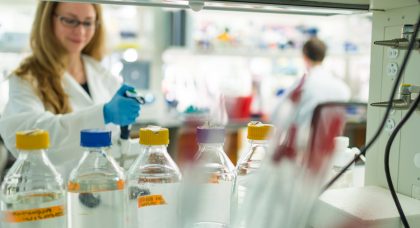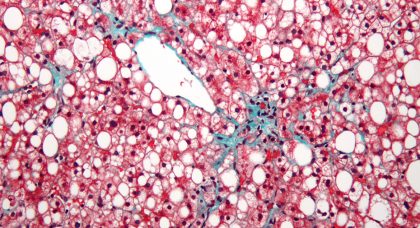Tag: Pagliarini Lab

Sen. Tammy Baldwin takes in ‘locally sourced science’ at Morgridge Institute
Forward-thinking science and childhood memories came full circle on Wednesday for U.S. Sen. Tammy Baldwin, who visited a lab at the Morgridge Institute for Research that is carrying on the inspired legacy of her grandfather, David E. Green.

Pagliarini wins ASBMB Young Scholar Award 2020
Dave Pagliarini won the Earl and Thressa Stadtman Young Scholar Award given by the American Society for Biochemistry and Molecular Biology (ASBMB).
Pagliarini wins young scholar honor
via American Society for Biochemistry and Molecular Biology
Morgridge Institute metabolism investigator Dave Pagliarini will receive the 2020 Earl and Thressa Stadtman Young Scholar Award from the American Society for Biochemistry and Molecular Biology (ASBMB). The award honors outstanding scholars with ten years or fewer of postdoctoral experience.

2019 Frontiers in Metabolism meeting explores advances in metabolic research
This fall, the Morgridge Institute for Research will convene international leaders in metabolic research at the third Frontiers in Metabolism—Mechanisms of Metabolic Diseases meeting.
Faculty receive WARF, Kellett, Romnes awards
via UW–Madison
Dave Pagliarini, associate professor of biochemistry and director of the Morgridge Institute for Research’s Metabolism Theme, studies mitochondria — ubiquitous organelles essential for cellular metabolism. His lab integrates classic biochemistry with large-scale methodologies to systematically define the functions of uncharacterized mitochondrial proteins and to establish the detailed mechanisms that drive disease-related mitochondrial pathways.

Taking new approaches to study lipid biology
Any budding scientist knows that oil and water don’t mix. However, for our largely water-filled cells to thrive, nature needs to devise clever ways to make and move around the lipids—fat and oil-like compounds—that comprise membranes and other key cellular parts.

Metabolism scientist wins prestigious AAAS Fellowship
For Danielle Lohman, her passion for science policy began when she heard a PhD chemist speak at a career conference about the American Association for the Advancement of Science (AAAS) fellowship at the State Department in Washington, D.C.

Lipid species offer insights into metabolic health
Two new Morgridge Institute for Research studies suggest the current tests, which measure the abundance of lipid classes, are insufficient. Rather, lipids identified and studied at the individual species level—instead of grouped in classes—may be better signatures of metabolic health.

Morgridge metabolism fellowship seeks to strengthen the research network
A graduate fellowship launched this year by the Morgridge Institute for Research will help bring “fresh eyes” to the growing pursuit of metabolism research at UW–Madison.

Cracking the code of coenzyme Q biosynthesis
Coenzyme Q (CoQ) is a vital cog in the body’s energy-producing machinery, a kind of chemical gateway in the conversion of food into cellular fuel. But six decades removed from its discovery, scientists still can’t describe exactly how and when it is made.

Pagliarini earns distinguished early career honor from Protein Society
Dave Pagliarini, lead investigator of metabolism for the Morgridge Institute for Research and associate professor of biochemistry at the University of Wisconsin–Madison, is being recognized for major early-career achievement by The Protein Society.

From physics to fitness, athletes in science challenge minds and bodies
From Rosalind Franklin to Edwin Hubble, history has shown that athleticism and scientific prowess are not mutually exclusive traits.

Mateusz Manicki: Collaboration breeds scientific opportunity
In order to understand the biochemical underpinnings of disease, it is imperative to shrink down to the molecular level. It’s this mentality that steered Mateusz Manicki all the way from Poland’s Gdansk University to Madison, Wisconsin to study mitochondrial proteins. Manicki will be using mass spectrometry resources to better understand the functionality of cells contributing to a given disease.

Pagliarini ‘energized’ by White House visit
It’s not every day someone gets the chance to stroll through the East Wing of the White House, snapping photos and checking out its famous Blue Room and Red Room. Dave Pagliarini experienced that and more during his trip to the nation’s capital May 5-6 to receive his Presidential Early Career (PECASE) award.

Pagliarini earns presidential recognition for research on mitochondria
Dave Pagliarini, Director of Metabolism at the Morgridge Institute for Research and Associate Professor of Biochemistry at the University of Wisconsin–Madison, has received the U.S. government’s highest honor for scientists in the early stages of their careers.

Morgridge, campus partner to power up ‘mass spec’ potential
The Morgridge Institute for Research, as part of its Metabolism Initiative, is working with a University of Wisconsin–Madison team to greatly expand the scope of “mass spec” applications on campus. A new resource housed in the UW–Madison Biotechnology Center brings together a multi-million dollar investment in mass spectrometry tools from multiple sources to form a central repository to tackle large-scale investigations.

Q&A with New Morgridge Metabolism Director Dave Pagliarini
Dave Pagliarini, UW–Madison associate professor of biochemistry, has been selected to lead the Morgridge Institute Metabolism Initiative, which will provide leadership, infrastructure and community building to this growing UW–Madison research area. Pagliarini, an expert on mitochondria structure and function, reflects on some of the opportunities ahead.

Morgridge Institute selects Pagliarini to lead campus metabolism initiative
Dave Pagliarini, a University of Wisconsin–Madison associate professor whose departmental home put metabolism research on the map worldwide, will help define the future of Wisconsin metabolism science as a lead investigator at the Morgridge Institute for Research.

UW metabolism researchers blaze new paths
With metabolic pathways now seen as essential players in human development and aging, as well as common diseases such as cancer, diabetes and Alzheimer’s, metabolism has become a wellspring of new knowledge for biologists.
